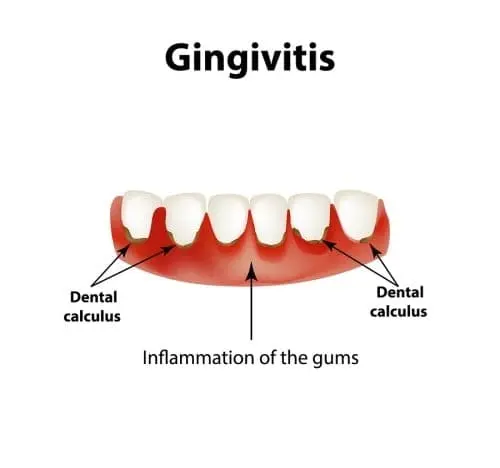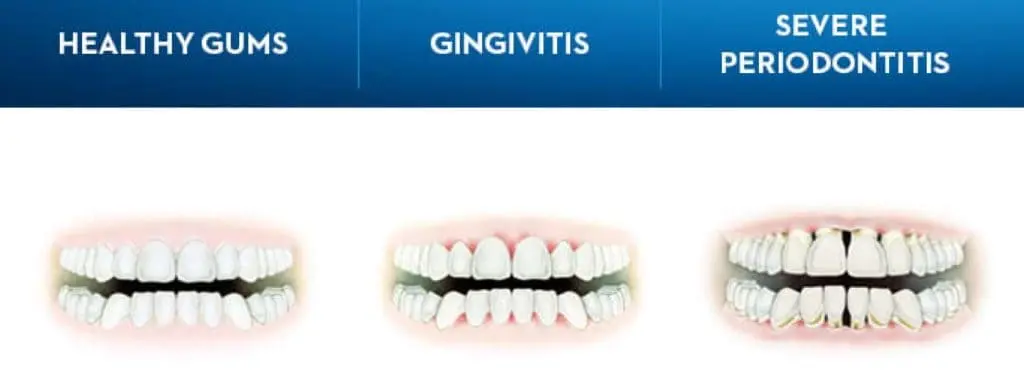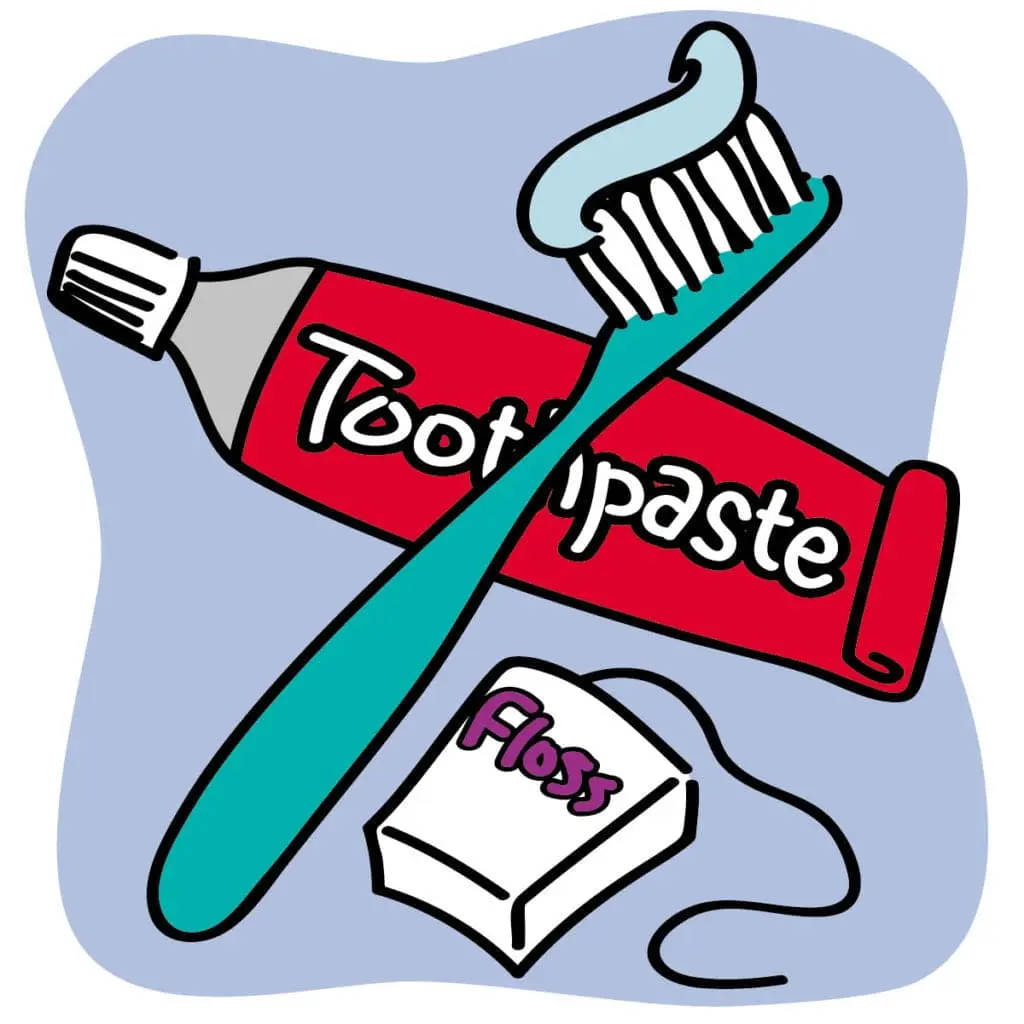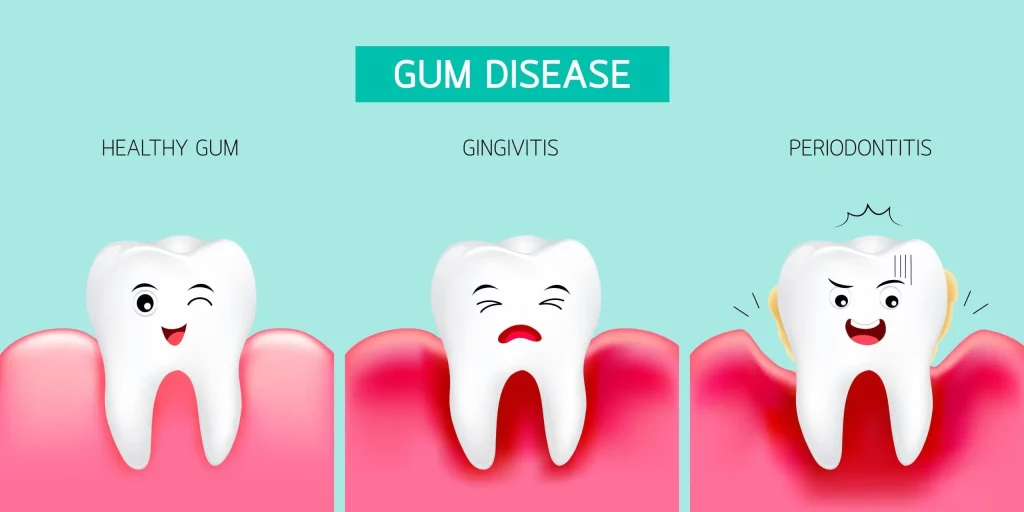Do your gums bleed when you brush or floss? Is it sore or outright painful when you eat? Do you have bad breath that mouthwash doesn’t cover up? Are your gums red or purple and swollen? Do they feel squishy, like a gummy bear? Do your gums look like they are receding? It’s very possible you have gingivitis.
What is Gingivitis?
Gingivitis is an inflammation of tissues around the teeth (also known as your gums or gingiva).

When it first starts, you may not even notice it. It is the very early development stage of “Periodontitis”. The gums become red and painfully swollen at this stage. Eventually, it gets to the point where it causes bleeding when you floss or even brush your teeth. It can also cause sleepless nights with an aching mouth.
How to know if you have gingivitis (Gum Disease)?
These are the symptoms of gingivitis (gum or periodontal disease symptoms) that will help you know if you have one:
- Swollen and Red Gums
- Frequent Gum Bleeding
- Receding Gums
- Halitosis or Bad Breath
- Fever (Early Stage)
- Malaise
- Pain
- Bleeding on Tooth Brushing

What are some causes of gingivitis?
Poor oral hygiene is a primary cause of gingivitis. Bacteria build up around your gum line, causing a sticky plaque to form on your teeth. If you don’t remove it, it hardens into tartar which in turn irritates the gums, causing them to inflame. This is why adequate brushing and flossing is required!
Did you know that regular smokers get gingivitis more often than non-smokers? Harmful substances such as nicotine and tar from cigarettes (or chewing tobacco) get introduced into the body. It should be no surprise that these can cause stains on teeth, halitosis, gum problems, oral thrush, cancers, cavities or tooth decay, etc. Nicotine also interferes with how our body responds to bacteria as it impairs the body’s immune functions.
Hormone changes during puberty, menopause and the menstrual cycle can also cause sensitivity in the gingiva.
Pregnancy is another possible cause. As stated by PubMed.gov, ovarian hormones such as estrogen and progesterone rise at this stage causing pregnant women to be more likely to experience gingivitis. It is said that gingivitis generally occurs in 60-75% of pregnant women, but if they practice good oral hygiene at the beginning of pregnancy, the rate will only be 0.3%.
Nutritional Deficiency is also a possible cause. Lack of good nutrition can affect one’s health causing various health problems including gingivitis. Vitamin C deficiency is linked to gum disease (think scurvy).
Human Immunodeficiency Virus (HIV) leads to a higher risk of gingivitis. Having HIV is a serious matter, it reduces the immune system’s effectiveness which affects all the body systems. The mouth will be a good indication if you have immunodeficiency observing it. At an early stage of HIV, several symptoms will show up, especially in your mouth.
- Dryness of Mouth & Cavities
- Oral lesions
- Thrush
- Gum Disease/Gingivitis
- Hairy Leukoplakia (A condition causing white lesions, or patches, on the tongue)
- Periodontitis
- Oral Cancer
These symptoms might give you a sign of whether you have existing HIV or not. But, the most effective way in knowing such is to get tested and you’re off to go. Getting tested is far more reliable than doubting yourself.
Medications may also lead to gingivitis. Drugs like anticonvulsants, calcium channel blockers, and immunosuppressants can cause gingival overgrowth. Make sure that the next time you visit your dentist, you mention ALL medications and supplements you are (or were) taking.
Diabetics have to be even more careful. If you’re diabetic and you accidentally brushed your teeth hard, you could cause your gums to become inflamed or swollen. Because you have high levels of blood glucose, it can take significantly longer for your gingivitis to heal. This is because decreased blood circulation makes it hard for the body to repair wounds. If you are diabetic and suspect gingivitis, you should seek medical assistance right away.
Stress is linked to suppressing the immune system which will affect the general functions of the body and can lead to gum disease.
How do you treat gingivitis?
- The cure starts within you. Always make to brush your teeth at least twice a day, in the morning and at night. Be smart in choosing toothbrushes as their textures could differ.
- A soft-bristled toothbrush is highly recommended. When brushing your teeth, don’t scrub too hard as it will irritate the swollen gums and may cause bleeding.
- Replace your toothbrush every 3 months.
- Flossing is also a good way to deep clean your teeth and gum line.
- Stop smoking. This is very important advice for all smokers, your oral health is not just in danger, you are prone to lung cancer and other health risks.

Maintaining proper oral hygiene is critical. It sounds like such a simple thing, but it can be one of the easiest things to help ensure good health.
As part of proper oral hygiene, visiting your dentist every 6 – 9 months is highly advisable. If you have multiple factors affecting your risk of gingivitis, it may be recommended that you come more often.
If you have any of the symptoms listed above or feel like something has changed with how your mouth feels, come in and see us. A check-up and cleaning may be all it takes but we’ll be able to put you on the path to proper oral care.
Weekend Dental Appointments & Late Hours Available

Call us at 403-948-3575 or Contact Airdrie Springs Dental Clinic for more information or to book an appointment today.
Need Immediate dental care, call your trusted and best dentist in Airdrie now.
If you would like to find out about choosing a dentist, download ‘THE SMART CONSUMER’S GUIDE TO How to Make Sure You Choose the Right Dentist’ here.


